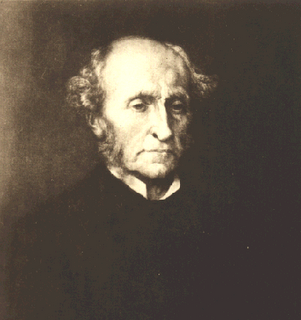 Mill and Liberty: A well-known political philosopher of nineteenth century Great Britain, John Stuart Mill published a comprehensive essay entitled On Liberty in 1859. For the most part, Mill claimed that righteous governments must be heavily rooted in the principles of Liberalism. Mill believed that genuine governments could only be enacted at the consent of the governed. And it would be with a republican constitution that the true ideas of Liberty could be espoused. He was also a staunch advocate of natural rights in which man was entitled to certain inalienable rights insofar as they were necessary to keep him free from governmental constraints. Another concept worth noting in Mill's essay is the idea of harm. He endorsed the notion that man had a natural right to act in any manner fitting to his character so long as he did not inflict harm upon others. This 'harm principle' as it came to be known stemmed greatly from Mill's belief in Utilitarianism. That is, man should always act in a way such that his actions produce the greatest amount of happiness for the greatest number of people. Friedrich Nietzsche would later label Mill a 'hedonist' for his espousal of Utilitarian ideals.
Mill and Liberty: A well-known political philosopher of nineteenth century Great Britain, John Stuart Mill published a comprehensive essay entitled On Liberty in 1859. For the most part, Mill claimed that righteous governments must be heavily rooted in the principles of Liberalism. Mill believed that genuine governments could only be enacted at the consent of the governed. And it would be with a republican constitution that the true ideas of Liberty could be espoused. He was also a staunch advocate of natural rights in which man was entitled to certain inalienable rights insofar as they were necessary to keep him free from governmental constraints. Another concept worth noting in Mill's essay is the idea of harm. He endorsed the notion that man had a natural right to act in any manner fitting to his character so long as he did not inflict harm upon others. This 'harm principle' as it came to be known stemmed greatly from Mill's belief in Utilitarianism. That is, man should always act in a way such that his actions produce the greatest amount of happiness for the greatest number of people. Friedrich Nietzsche would later label Mill a 'hedonist' for his espousal of Utilitarian ideals.
Thursday, November 30, 2006
Mill and Liberty
 Mill and Liberty: A well-known political philosopher of nineteenth century Great Britain, John Stuart Mill published a comprehensive essay entitled On Liberty in 1859. For the most part, Mill claimed that righteous governments must be heavily rooted in the principles of Liberalism. Mill believed that genuine governments could only be enacted at the consent of the governed. And it would be with a republican constitution that the true ideas of Liberty could be espoused. He was also a staunch advocate of natural rights in which man was entitled to certain inalienable rights insofar as they were necessary to keep him free from governmental constraints. Another concept worth noting in Mill's essay is the idea of harm. He endorsed the notion that man had a natural right to act in any manner fitting to his character so long as he did not inflict harm upon others. This 'harm principle' as it came to be known stemmed greatly from Mill's belief in Utilitarianism. That is, man should always act in a way such that his actions produce the greatest amount of happiness for the greatest number of people. Friedrich Nietzsche would later label Mill a 'hedonist' for his espousal of Utilitarian ideals.
Mill and Liberty: A well-known political philosopher of nineteenth century Great Britain, John Stuart Mill published a comprehensive essay entitled On Liberty in 1859. For the most part, Mill claimed that righteous governments must be heavily rooted in the principles of Liberalism. Mill believed that genuine governments could only be enacted at the consent of the governed. And it would be with a republican constitution that the true ideas of Liberty could be espoused. He was also a staunch advocate of natural rights in which man was entitled to certain inalienable rights insofar as they were necessary to keep him free from governmental constraints. Another concept worth noting in Mill's essay is the idea of harm. He endorsed the notion that man had a natural right to act in any manner fitting to his character so long as he did not inflict harm upon others. This 'harm principle' as it came to be known stemmed greatly from Mill's belief in Utilitarianism. That is, man should always act in a way such that his actions produce the greatest amount of happiness for the greatest number of people. Friedrich Nietzsche would later label Mill a 'hedonist' for his espousal of Utilitarian ideals.
Wednesday, November 29, 2006
Thoreau and Transcendentalism
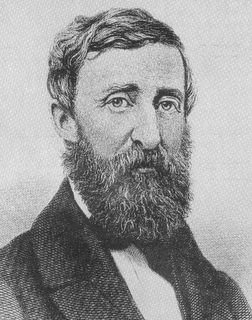 Thoreau and Transcendentalism: A major premise of transcendentalism entails the idea of striking a balance between industry and nature. Otherwise known as the pastoral ideal, this balance could effectively be achieved through simplifying and harmonizing man's position in the natural world. It seems that man's destiny is to rip materials from First Nature (that which God creates) and transform them into Second Nature (that which man builds). Nineteenth-century America saw a rapid rise in the pace of industrialization, and thus, transcendentalists like Henry David Thoreau became concerned. To a certain degree, finding the balance between industry and nature is a constant process. Convinced that America was heading down the wrong path with respect to industrialization, Thoreau attempted to reshape the way that Americans understood their relationship to nature. In fact, with his 1854 publication of Walden, Thoreau put forth his vision for a basic life in which man could live on mere subsistence farming and sub-manufacture. Through rudimentary farming techniques and rigorous self-discipline, an elemental existence for mankind was achievable. Therefore, Thoreau's time spent at Walden Pond serves as an indelible testament to the transcendental movement.
Thoreau and Transcendentalism: A major premise of transcendentalism entails the idea of striking a balance between industry and nature. Otherwise known as the pastoral ideal, this balance could effectively be achieved through simplifying and harmonizing man's position in the natural world. It seems that man's destiny is to rip materials from First Nature (that which God creates) and transform them into Second Nature (that which man builds). Nineteenth-century America saw a rapid rise in the pace of industrialization, and thus, transcendentalists like Henry David Thoreau became concerned. To a certain degree, finding the balance between industry and nature is a constant process. Convinced that America was heading down the wrong path with respect to industrialization, Thoreau attempted to reshape the way that Americans understood their relationship to nature. In fact, with his 1854 publication of Walden, Thoreau put forth his vision for a basic life in which man could live on mere subsistence farming and sub-manufacture. Through rudimentary farming techniques and rigorous self-discipline, an elemental existence for mankind was achievable. Therefore, Thoreau's time spent at Walden Pond serves as an indelible testament to the transcendental movement.
Tuesday, November 28, 2006
Nietzsche and Nihilism
 Nietzsche and Nihilism: According to Friedrich Nietzsche's philosophy, man should only be concerned with his existence in this life. Although Nietzsche appears to espouse a philosophy of atheistic humanism, which undoubtedly contains many nihilistic features, he is an existentialist at bottom. His writing is aphoristic in nature, which requires the reader to supply personal interpretations of his words. In general, Nietzsche asserts that life has no explicit purpose, and thus, man should seek out an implicit meaning for his life. He attributes the nihilistic features of life to Christian morality, which is ultimately a product of fear. In effect, Nietzsche believes that Christianity hinders man from becoming his true Self. He refers to priests as "the preachers of death" due to their undying attachment to the afterlife. By teaching its adherents to put Faith in a life unbeknownst to exist, Nietzsche suggests that Christianity is fundamentally an anti-life institution. He also argues that God is merely an abstract idea Who ceases to exist when man denies belief in Him. Lastly, Nietzsche claims that he arrived at these philosophical conclusions concerning God and Christianity through instinct instead of reason.
Nietzsche and Nihilism: According to Friedrich Nietzsche's philosophy, man should only be concerned with his existence in this life. Although Nietzsche appears to espouse a philosophy of atheistic humanism, which undoubtedly contains many nihilistic features, he is an existentialist at bottom. His writing is aphoristic in nature, which requires the reader to supply personal interpretations of his words. In general, Nietzsche asserts that life has no explicit purpose, and thus, man should seek out an implicit meaning for his life. He attributes the nihilistic features of life to Christian morality, which is ultimately a product of fear. In effect, Nietzsche believes that Christianity hinders man from becoming his true Self. He refers to priests as "the preachers of death" due to their undying attachment to the afterlife. By teaching its adherents to put Faith in a life unbeknownst to exist, Nietzsche suggests that Christianity is fundamentally an anti-life institution. He also argues that God is merely an abstract idea Who ceases to exist when man denies belief in Him. Lastly, Nietzsche claims that he arrived at these philosophical conclusions concerning God and Christianity through instinct instead of reason.Monday, November 27, 2006
Marx and Secularization
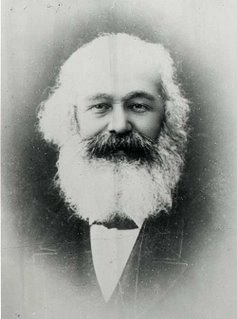 Marx and Secularization: The political philosophy of Karl Marx can be considered one of the most powerful forces of secularization in nineteenth-century European society. It essentially instructed people to become materialists. Belief in the hereafter was a means of social control; an "opiate of the masses." As a member of the Young Hegelians, he devoutly adhered to the basic tenets of Georg Hegel's philosophy of history. Marx believed that history could be understood as a rational progression, and thus, it could also be explained scientifically. He even went so far as to claim that his political philosophy was scientific in the sense that it applied the Hegelian dialectic to social concerns. In fact, Marx asserted that the growing industrial proletariat represented a thesis and the ruling capitalist bourgeoisie signified its anti-thesis. Therefore, according to the Hegelian dialectic, which deemed all historical events as inevitable by their very nature, these two social classes were bound to clash and form a synthesis: classless society. The resulting utopian society would effectively encompass the elements of basic communism where everyone's fundamental interest resided in economics. However, such a society could only be formed after many years of tension between the proletariat and the bourgeoisie. This tension would have at least brought about the means of production to sustain a communal society. In short, Marx would have never considered Russia as an appropriate setting to have the first communist revolution.
Marx and Secularization: The political philosophy of Karl Marx can be considered one of the most powerful forces of secularization in nineteenth-century European society. It essentially instructed people to become materialists. Belief in the hereafter was a means of social control; an "opiate of the masses." As a member of the Young Hegelians, he devoutly adhered to the basic tenets of Georg Hegel's philosophy of history. Marx believed that history could be understood as a rational progression, and thus, it could also be explained scientifically. He even went so far as to claim that his political philosophy was scientific in the sense that it applied the Hegelian dialectic to social concerns. In fact, Marx asserted that the growing industrial proletariat represented a thesis and the ruling capitalist bourgeoisie signified its anti-thesis. Therefore, according to the Hegelian dialectic, which deemed all historical events as inevitable by their very nature, these two social classes were bound to clash and form a synthesis: classless society. The resulting utopian society would effectively encompass the elements of basic communism where everyone's fundamental interest resided in economics. However, such a society could only be formed after many years of tension between the proletariat and the bourgeoisie. This tension would have at least brought about the means of production to sustain a communal society. In short, Marx would have never considered Russia as an appropriate setting to have the first communist revolution.
Monday, November 20, 2006
Hegel and History
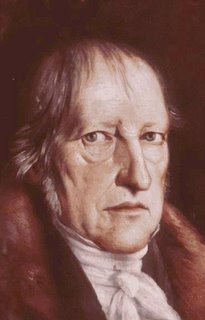 Hegel and History: Widely regarded as an ardent optimist, Georg Hegel espoused a philosophy of history. His philosophy can be seen as a systematic inquiry into the various happenings of society and history over time. In effect, Hegel's philosophy claims that history is an inevitable progression, as it flows either toward (BC) or away (AD) from Christ. Therefore, every event in history has happened for a specific reason. Hegel saw history as a rational process which he sought to explain scientifically. He refers to any historical event as a thesis and the dialectical opposite of that event as the anti-thesis. And hence, the Hegelian dialectic is born! When these two opposing events clash, which is bound to occur given that history is inevitable; Hegel claims that a synthesis emerges. This synthesis contains a combination of elements from the two clashing events, and therefore, Hegel considered it to be a greater evocation of reality. Ultimately however, Hegel's philosophy of history can be viewed as a continuation of Greek determinism, where fate controls all events, and thus, the free will of mankind ceases to exist.
Hegel and History: Widely regarded as an ardent optimist, Georg Hegel espoused a philosophy of history. His philosophy can be seen as a systematic inquiry into the various happenings of society and history over time. In effect, Hegel's philosophy claims that history is an inevitable progression, as it flows either toward (BC) or away (AD) from Christ. Therefore, every event in history has happened for a specific reason. Hegel saw history as a rational process which he sought to explain scientifically. He refers to any historical event as a thesis and the dialectical opposite of that event as the anti-thesis. And hence, the Hegelian dialectic is born! When these two opposing events clash, which is bound to occur given that history is inevitable; Hegel claims that a synthesis emerges. This synthesis contains a combination of elements from the two clashing events, and therefore, Hegel considered it to be a greater evocation of reality. Ultimately however, Hegel's philosophy of history can be viewed as a continuation of Greek determinism, where fate controls all events, and thus, the free will of mankind ceases to exist.
Sunday, November 19, 2006
Kant and Morality
 Kant and Morality: Often considered the last great philosopher of the Enlightenment era, Immanuel Kant put forth a moral philosophy based solely upon reason itself. As the archetypal German idealist, Kant contended that through reason, every man will arrive at the same conclusion concerning morality. And that is the universal moral law or what Kant called the "categorical imperative." The categorical imperative declares that man should always act in a manner such that the maxim of his action shall become a universal law. In other words, "Do unto others as you would have them do unto you" (Luke 6:31). Moreover, Kant claimed that no man should make himself an exception to this moral law since it effectively holds true for everyone. In doing so, Kant suggested that mankind will raise its collective moral consciousness. That is, people will be treated as ends rather than means, and thus, the kingdom of ends will manifest itself on Earth in the form of a republic. But when Kant stated, "the death of dogma is the birth of morality," it was clear for him that organized religion and objective morality were mutually exclusive concepts.
Kant and Morality: Often considered the last great philosopher of the Enlightenment era, Immanuel Kant put forth a moral philosophy based solely upon reason itself. As the archetypal German idealist, Kant contended that through reason, every man will arrive at the same conclusion concerning morality. And that is the universal moral law or what Kant called the "categorical imperative." The categorical imperative declares that man should always act in a manner such that the maxim of his action shall become a universal law. In other words, "Do unto others as you would have them do unto you" (Luke 6:31). Moreover, Kant claimed that no man should make himself an exception to this moral law since it effectively holds true for everyone. In doing so, Kant suggested that mankind will raise its collective moral consciousness. That is, people will be treated as ends rather than means, and thus, the kingdom of ends will manifest itself on Earth in the form of a republic. But when Kant stated, "the death of dogma is the birth of morality," it was clear for him that organized religion and objective morality were mutually exclusive concepts.
Saturday, November 18, 2006
Kierkegaard and Despair
 Kierkegaard and Despair: According to the existentialist philosophy of Søren Kierkegaard, the Self is freedom. It is not only the freedom to choose, but also the freedom to create choices. Therefore, man is fundamentally neither his thoughts nor his feelings but rather he is his Self. The Self relates directly to itself and is subject to no one and everyone at the same time. In effect, when man does not come into a full consciousness of his Self, then he is said to be in despair. Just as a physician will tell you that no one is completely healthy, anyone who knows anything about man will tell you that he must despair at certain moments in his life. To be in despair is to reflect upon the Self. If man does not engage in the art of despair, then he shall become stuck in a state of inertia with no effective progression or regression and that is the worst state of all. But more importantly, from where does despair originate? For Kierkegaard, it originates from doubt. Whenever man doubts, whether it be something as monumental as the existence of God or as mundane as the directions to Grandma's house, he seeks to upend custom in favor of novelty. And when the novelty proves insufficient for man's needs, he quickly brushes it aside in despair. So, the questions begs wonderment, does doubt beget sin or does sin beget doubt? Kierkegaard rightfully concludes that doubt begets sin, as man cannot fully manage the infinite desires that inevitably arise when he assumes the mentality of a Doubting Thomas.
Kierkegaard and Despair: According to the existentialist philosophy of Søren Kierkegaard, the Self is freedom. It is not only the freedom to choose, but also the freedom to create choices. Therefore, man is fundamentally neither his thoughts nor his feelings but rather he is his Self. The Self relates directly to itself and is subject to no one and everyone at the same time. In effect, when man does not come into a full consciousness of his Self, then he is said to be in despair. Just as a physician will tell you that no one is completely healthy, anyone who knows anything about man will tell you that he must despair at certain moments in his life. To be in despair is to reflect upon the Self. If man does not engage in the art of despair, then he shall become stuck in a state of inertia with no effective progression or regression and that is the worst state of all. But more importantly, from where does despair originate? For Kierkegaard, it originates from doubt. Whenever man doubts, whether it be something as monumental as the existence of God or as mundane as the directions to Grandma's house, he seeks to upend custom in favor of novelty. And when the novelty proves insufficient for man's needs, he quickly brushes it aside in despair. So, the questions begs wonderment, does doubt beget sin or does sin beget doubt? Kierkegaard rightfully concludes that doubt begets sin, as man cannot fully manage the infinite desires that inevitably arise when he assumes the mentality of a Doubting Thomas.Friday, November 17, 2006
The Ghost of Dostoyevsky
 The Ghost of Dostoyevsky: With the publication of Crime and Punishment in 1866, Fyodor Dostoyevsky became one of Russia's most prominent authors in the nineteenth century. And as such, he has been labeled one of the founding fathers of the philosophical movement known as existentialism. In particular, his Notes from Underground (1864) has been depicted as a founding work of existentialism. For Dostoyevsky, war is the rebellion of the people against the idea that reason guides everything. And thus, reason by itself, cannot be a guiding principle for either history or mankind. In a sense, then, there must be something (Faith) beyond reason, which man cannot fully comprehend, that drives human actions. Having been exiled to the city of Omsk (Siberia) in 1849, many of Dostoyevsky's writings entail notions of suffering and despair. Perhaps his best known existentialist work is "The Grand Inquisitor." As a subsection of his larger novel, The Brothers Karamazov (1880), Dostoyevsky sought to uncover people's reactions when Christ returned to Earth. Set during the fifteenth-century Spanish Inquisition, Christ is arrested by Church officials and told that the free will He gave to man through His death on the Cross was the most profound injustice of all. And ultimately, that's because the vast majority of mankind could never be expected to handle a mental burden as heavy as free will.
The Ghost of Dostoyevsky: With the publication of Crime and Punishment in 1866, Fyodor Dostoyevsky became one of Russia's most prominent authors in the nineteenth century. And as such, he has been labeled one of the founding fathers of the philosophical movement known as existentialism. In particular, his Notes from Underground (1864) has been depicted as a founding work of existentialism. For Dostoyevsky, war is the rebellion of the people against the idea that reason guides everything. And thus, reason by itself, cannot be a guiding principle for either history or mankind. In a sense, then, there must be something (Faith) beyond reason, which man cannot fully comprehend, that drives human actions. Having been exiled to the city of Omsk (Siberia) in 1849, many of Dostoyevsky's writings entail notions of suffering and despair. Perhaps his best known existentialist work is "The Grand Inquisitor." As a subsection of his larger novel, The Brothers Karamazov (1880), Dostoyevsky sought to uncover people's reactions when Christ returned to Earth. Set during the fifteenth-century Spanish Inquisition, Christ is arrested by Church officials and told that the free will He gave to man through His death on the Cross was the most profound injustice of all. And ultimately, that's because the vast majority of mankind could never be expected to handle a mental burden as heavy as free will.
Thursday, November 16, 2006
The Confessing Church
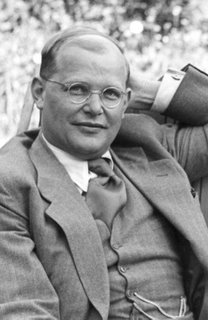 The Confessing Church: When the Nazis were consolidating their power in Germany during the 1930s, one of the areas they exercised significant control over was the German State Church (Lutheranism). Various Protestant theologians, including Dietrich Bonhoeffer (pictured above) and Karl Barth, decided to resist the encroaching Nazi influence. Common forms of resistance entailed underground assemblies in order to espouse anti-Nazi rhetoric as well as the active hiding of many Jews from the horrors of the concentration camps. This underground resistance movement on behalf of German pastors and theologians became known as The Confessing Church. Its founding document was the Barmen Declaration, which rejected Nazism as not being in line with Christian doctrine. Unfortunately, many leaders of this underground movement, including Bonhoeffer himself, were sent to concentration camps and later executed for their "treasonous" undertakings. His 1937 book The Cost of Discipleship served as a testament to the degree in which Bonhoeffer held the Grace of God above all else. In the end, Bonhoeffer drew heavily upon Scripture as his source of Faith because the situation in Nazi Germany proved ghastly by all accounts of Christian morality.
The Confessing Church: When the Nazis were consolidating their power in Germany during the 1930s, one of the areas they exercised significant control over was the German State Church (Lutheranism). Various Protestant theologians, including Dietrich Bonhoeffer (pictured above) and Karl Barth, decided to resist the encroaching Nazi influence. Common forms of resistance entailed underground assemblies in order to espouse anti-Nazi rhetoric as well as the active hiding of many Jews from the horrors of the concentration camps. This underground resistance movement on behalf of German pastors and theologians became known as The Confessing Church. Its founding document was the Barmen Declaration, which rejected Nazism as not being in line with Christian doctrine. Unfortunately, many leaders of this underground movement, including Bonhoeffer himself, were sent to concentration camps and later executed for their "treasonous" undertakings. His 1937 book The Cost of Discipleship served as a testament to the degree in which Bonhoeffer held the Grace of God above all else. In the end, Bonhoeffer drew heavily upon Scripture as his source of Faith because the situation in Nazi Germany proved ghastly by all accounts of Christian morality.
Subscribe to:
Posts (Atom)